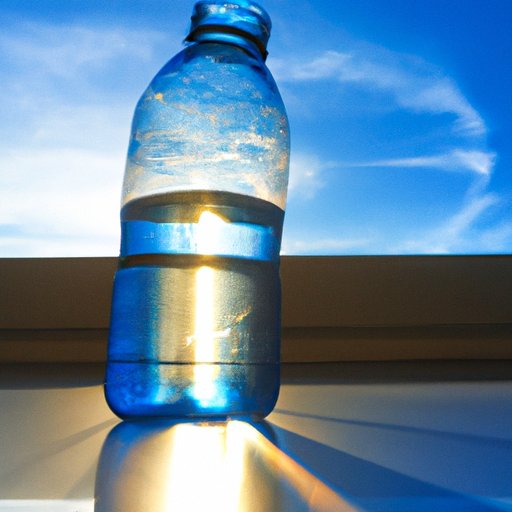Introduction
Water is one of the most essential components of human life, and hydrating regularly is essential to maintain our physical and mental health. But have you ever wondered how long you can survive without water? In this article, we will explore the science behind dehydration, the effects of not drinking enough water, and ways in which you can survive under the limited supply of water. No matter who you are, it is crucial to understand why water is essential to your health and how much you need to consume daily.
The Science of Dehydration: How Long Can a Person Survive Without Water?
Dehydration is defined as the state of having a deficiency of water in the body. This can occur due to various factors like sweating excessively, urinating more than usual, or consuming diuretics like alcohol. The human body cannot function properly without water, and dehydration can result in several problems such as dysfunction of vital organs, the inability to regulate body temperature, and electrolyte imbalances.
The amount of time a person can go without water depends on several factors like age, body weight, physical activity, and environmental conditions. According to studies, the average human can survive for about three to five days without water. However, this can vary depending on the factors mentioned above.
Studies have shown that environmental conditions play a significant role in determining how long a person can survive without water. For instance, people who are stranded in the desert may be able to survive without water for up to four days due to their body’s ability to conserve water at night. In contrast, someone lost at sea may only survive 2-3 days without water as saltwater or seawater consumption can exacerbate dehydration.
Water: Our Most Essential Need – Discovering How Long We Can Go Without It
Water is our most essential need and is responsible for maintaining several bodily functions such as transporting nutrients, regulating body temperature, and flushing out toxins. The average human body can survive for about 3-5 days without water, depending on the factors mentioned above.
The human body requires a minimum of eight to ten cups of water daily to function correctly. There is a common misconception that only drinking water is enough to meet your daily water intake, but we also get water from the food we eat. Fruits and vegetables are a great source of water, with roughly 20% of our daily water intake coming from food.
Consequences of Dehydration: What Happens When We Don’t Drink Enough Water?
Not consuming enough water has several adverse consequences on our physical and mental health; the most common is dehydration. Dehydration can make you feel exhausted, hungry, and thirsty. It can also lead to irritability, headaches, dizziness, and difficulty sleeping.
Dehydration can also result in more severe consequences. Chronic dehydration can lead to kidney stones, osteoporosis, digestive issues, and increased risk for several diseases such as cancer, heart disease, and urinary tract infections.
Surviving Without Water: Stories of People Who Have Endured Long Periods Without Water
There are numerous real-life stories of people who have endured long periods without water due to various circumstances. One such story is that of Mauro Prosperi, an experienced runner who was taking part in a marathon in the Sahara desert in 1994. Mauro became lost, and his supplies soon ran out, leaving him to survive in the desert for several days without water. He attempted to drink his urine, but it was eventually vomited back up. Mauro was eventually rescued and made a full recovery.
Another story is that of Aron Ralston, who became trapped in a slot canyon in Utah and survived with limited water for five days. He was eventually forced to amputate his own arm to escape.
Staying Hydrated: Tips and Tricks to Avoid Dehydration and Lengthen Your Time Without Water
Staying hydrated is essential to avoid the consequences of dehydration, which can range from mild to severe. It is essential to ensure that you consume enough fluids throughout the day, especially during intense physical activity or when exposed to hot environments. Here are some tips and tricks to avoid dehydration and increase your survival time in case of water scarcity:
- Always carry a reusable water bottle and drink plenty of water during the day.
- Monitor your urine color. A pale yellow color indicates that you are properly hydrated.
- Avoid drinking alcohol, as it is a diuretic and can exacerbate dehydration.
- Eat plenty of fruits and vegetables which contain a high water content.
- Wear light-colored, lightweight clothing when exposed to the hot sun.
- Avoid physical activity during the hottest part of the day.
- Create a survival plan with alternative water sources that can be accessed in an emergency.
Understanding Your Body’s Water Needs: The Ideal Amount of Water to Drink to Avoid Dehydration
There is no one-size-fits-all answer to the appropriate amount of water a person should drink. This can vary from person to person based on their age, weight, sex, levels of physical activity, and environmental conditions. The average person should drink at least eight to ten cups of water daily, but factors such as illness, hot weather, and intense physical activity require higher intake.
It is essential to stay hydrated, but overhydration can be harmful to your health. Drinking too much water can result in water intoxication, which can lead to nausea, headaches, seizure, and even death.
Conclusion
The human body cannot function correctly without water, so it is crucial to stay hydrated to maintain optimal health and well-being. In this article, we explored the science of dehydration, how long a person can survive without water, the consequences of dehydration, and tips for staying hydrated under limited water supply. It’s important to have a good understanding of how much water you need to consume daily and develop a survival plan, especially when engaging in physical activity or venturing to environments without immediate access to water.
